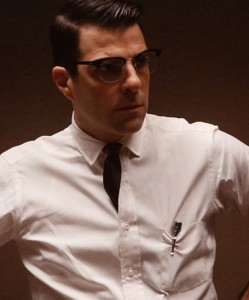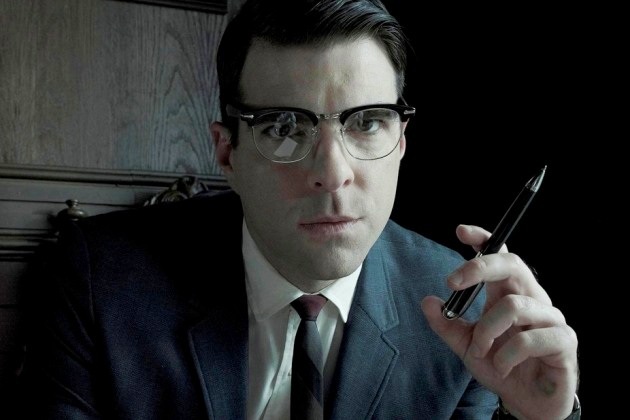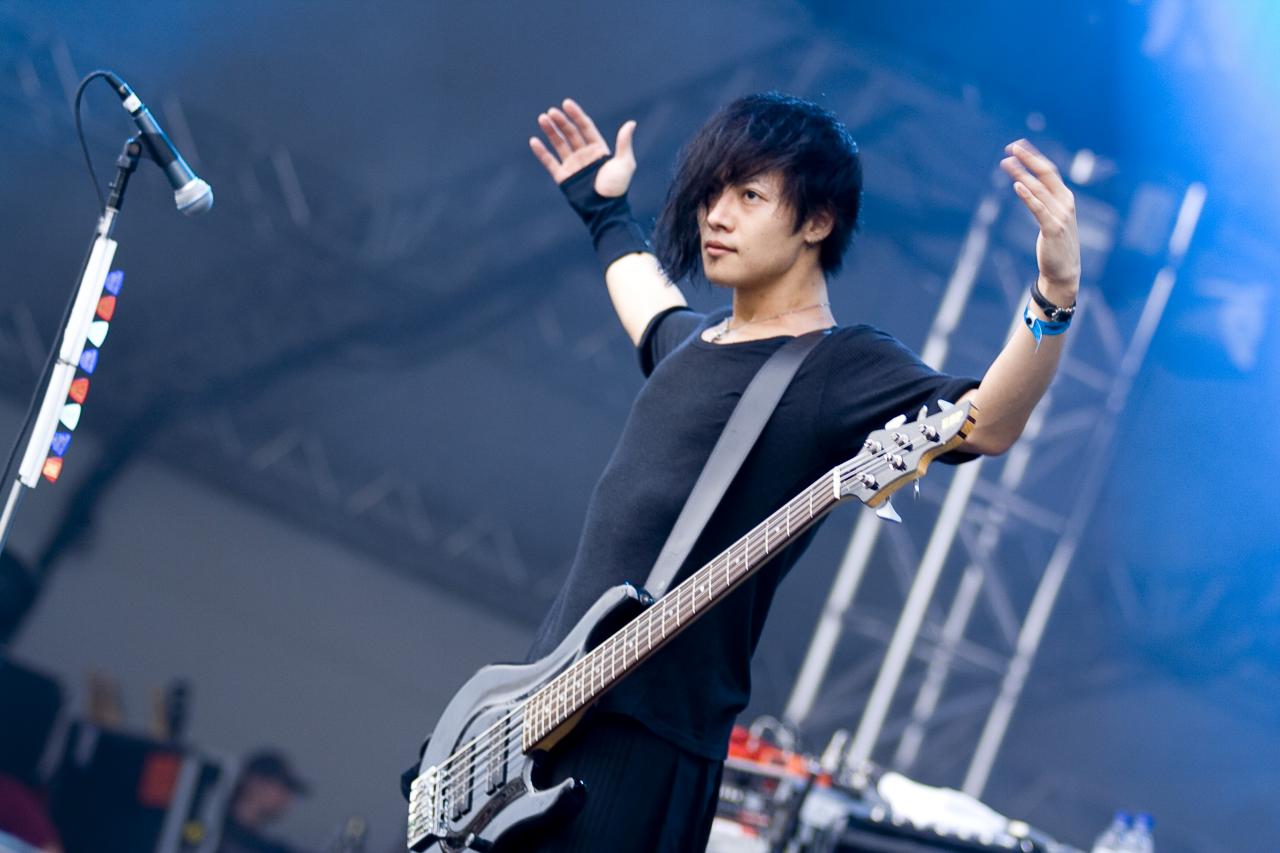The following contains spoilers for American Horror Story: Asylum
Last night, on what was without a doubt one of the most brutally shocking episodes in the history of cable television, American Horror Story: Asylum fully addressed its most important mystery — revealing the identity of the horrific serial killer aptly named “Bloody Face”. Leading up to the reveal, there was all kinds of speculation. Is it even a man? Could it be returning cast member Dylan McDermott? In the end, all speculation was put to rest when Dr. Oliver Thredson (played by Zachary Quinto) pulled the mask made of human remains over his face.
This final reveal is the culmination of a process which Quinto began at the beginning of the season, carefully laying the groundwork necessary to make this twist all the more shocking. “I felt like my responsibly became to create a character people could trust, or at least trust initially,” he said in an interview earlier today. “And (they would) have some hope that perhaps he is actually the one voice of reason and sanity within this chaotic world.”
Having been approached by (showrunner and co-creator) Ryan Murphy and asked to play this role last season, Quinto addressed the similarities between Thredson/Bloody Face and his breakout role on the former NBC series Heroes, Sylar/Gabriel Gray. “I think any time an actor revisits territory that they’ve been in before, it can be a source of trepidation, and it was for me,” he said. “But part of the reason I loved what the opportunity stood for was that I got to really build something. With Heroes, that character was built before I was ever attached to it. There were eight episodes of anticipation that were built before you met Gabriel Gray in Heroes, but I had no participation in that; it was just the character spoken about. So, for me, it was really exciting to get to go in having all the information, and actually be a part of the process of creating a character.”
During this hour-long Q&A session, DarkMedia had the opportunity to ask Quinto what he believed were the essential elements of a horror story. He also discussed what makes American Horror Story truly American, and what goes on in the mind of Dr. Thredson.
On what makes a good horror story: “(Projecting) societal fear back at the audience, on some visceral level, is the most compelling kind of horror. And I think that’s what this show is doing in a lot of ways…tackling issues that have relevance to our modern society through another point of view, another time period, filtered through different perspectives — and really getting to the root of what drives us as a society, as a culture, or as an audience. I think that can be really scary, and I think that’s what’s really happening in a lot of ways with the characters that we’re all playing this year, and the scenarios in which they find themselves.”
 On how Thredson is fundamentally different from Sylar: “It’s more rooted in character and relationship, and less rooted in peripheral elements like superpowers. I liked that this was grounded and real, and something I’m always drawn to is that kind of connection.
On how Thredson is fundamentally different from Sylar: “It’s more rooted in character and relationship, and less rooted in peripheral elements like superpowers. I liked that this was grounded and real, and something I’m always drawn to is that kind of connection.
On how he personally feels about the scene where Thredson implements ‘aversion therapy’ as a cure for homosexuality: “I think the scene was very reflective of the mentality of the time. I think it was powerful to revisit it, and to present an audience with a reflection (of) that kind of really abhorrent thinking. And, obviously, we’ve come a long way since then. And that’s great, there’s so much progress made, and more to do. I think it’s always good when you’re able to, as an actor, allow your work to be some kind of a conduit for social discourse and examination of where we are as a society. And I think this installment of the show is really doing that in a lot of powerful ways, that being one of many. It’s another reason why I’m grateful to be a part of this kind of storytelling and this kind of environment.”
On what comes next: “Next week’s show is called ‘The Origins of Monstrosity’, and it really dives into a lot of the roots of the characters in this world and the asylum. So, a lot of things will become clearer and probably even more disturbing in the next couple of weeks.”
On the working dynamic between himself and real-life friend Sarah Paulson (Lana Winters): “I have such respect for Sarah as an actress, but it’s rare and unique opportunity to show up to work with a really good friend. Oftentimes, friendships are formed on-set and through these kinds of experiences; working together in such intimate and unusual ways. It’s even a richer experience when you have that foundation of friendship; there’s trust and sensitivity to each other, our instincts and our individual process. It’s really a remarkable gift, in a way. We’re also able to have more fun, I think, and laugh at the situation. There’s less awkwardness. I think it strengthens the connection the characters share, whether it’s friendship or torture or hostage — whatever it may be.”
On Oliver Thredson as a character: “I think part of being a psychopath is an ability to dissociate from one reality and create another one completely, and I think he does that expertly. I think it’s a level of training, medical training, and intuition instincts, and I think he’s very skilled. I think that’s how he’s gotten away with a lot of what he does. So, I think he does believe in it (his therapy), which is another layer of travesty in the character; that he could have been somebody else. He could have made a more significantly positive contribution had he re-channeled his traumas and energy.”

On why and how Bloody Face targets his victims: “You’ll find out much more about that in the coming weeks…it all traces back to one source of trauma that then sort of branches out to all of these unfortunate women.”
On returning for Season 3: “I haven’t had any conversations with Ryan about what he’s thinking for the third season, so I have no idea. I know he has plans, and if they involve me I’m sure I’ll have a call.”
On whether or not Thredson is also Bloody Face in the present timeline: “Wouldn’t that be cool? You’ll find all that out…It’s really driving to a point very, very well; the storytelling structure of this asylum is going to pay off in a really big way. All of the questions people have, that the episodes right now are generating, will definitely be answered.”
On why AHS is ‘uniquely American’: “I do think it’s uniquely American in the way that it’s structured, and in the certain instances where it’s an homage to stories that have come before it. And also in what it’s looking at: the Catholic institutions, in this country in particular, and the social history, racism and homophobia, insanity and psychiatry, and the idea of how to treat people who are mentally ill. I think those are all very American ideas and concepts, and I think the way in which we dive into them is also very American in the style of storytelling.”
On how far is too far: “If there is a line that I won’t cross, I haven’t reached it yet, at least on this show. I’m sure it’s particularly circumstantial, and I’d know it if I was ever in that situation. I think things are handled with enough respect, and professional and creative acumen in the world of American Horror Story that I’ve always felt safe, and I’ve always felt supported. So, I think those are the two most important elements, with trust and professionalism, and we have those in excess at American Horror Story and that’s good.”
Stay tuned for DarkMedia’s continued coverage of American Horror Story: Asylum, and all the latest breaking news.
















Comments are closed.